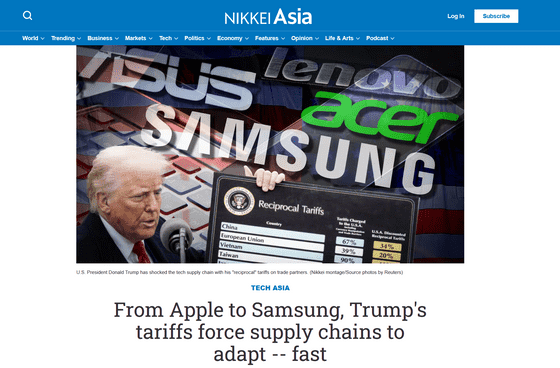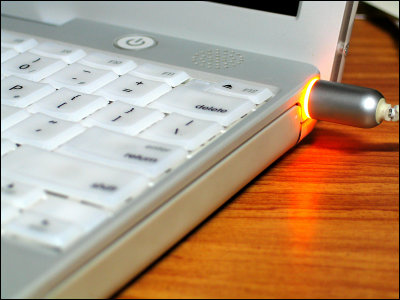It turns out that Apple, Dell and Microsoft rushed to ship products to the US to avoid tariffs

Due to the 'reciprocal tariffs' announced by President Donald Trump on April 2, 2025, companies importing products from overseas into the United States will have to pay up to 50% tariffs to the government, so manufacturers that are particularly affected by the tariffs are scrambling to respond, such as Apple flying five planes loaded with iPhones in just three days to avoid tariffs. In a similar move, Nikkei Asia, the English-language newspaper of the Nikkei Shimbun,
From Apple to Samsung, Trump's tariffs supply force chains to adapt -- fast - Nikkei Asia
https://asia.nikkei.com/Business/Technology/Tech-Asia/From-Apple-to-Samsung-Trump-s-tariffs-force-supply-chains-to-adapt-fast

Companies including Apple, Dell, Microsoft and Lenovo have reportedly been pressuring their suppliers to fly as many premium devices as possible to the US, especially PCs priced above $3,000.
'Our customers have asked us to manufacture and airfreight as many home appliances as possible,' said an executive at a company that supplies Apple and other companies. 'But our biggest challenge is that we are running low on stocks of parts and materials. With less than a week until the new tariffs go into effect, we are limited in how many we can ship.'
Suppliers aren't the only ones scrambling to respond. A manager at an international air transport company told Nikkei Asia, 'We've received an urgent request to increase the number of flights from Asia because we need to complete all customs procedures by April 8th, US time.'

The response from some manufacturers suggests they were at a loss as to what to do: HP, for example, initially told its suppliers that there was little they could do and they should go ahead with their existing shipping plans, but then reversed its decision within 24 hours, urging them to ship as many devices as possible over the next few days.
There were also moves to search for intermediate transportation hubs that would be as little affected by tariffs as possible. An executive at one supplier said, 'Many customers who have chosen Vietnam in the past have called us in the past few days and asked us to help them ship products from their Philippine factories because the tariff in the Philippines is only 17%.' In addition, under President Trump's reciprocal tariffs, the tariff on Vietnam is set at a fairly high rate of 46%.
Similarly, HP is asking suppliers to increase production in Mexico, where tariffs are lower than in China and Thailand, and is also considering moving some production to the United States, according to people familiar with the matter.

Dell, on the other hand, has urged Vietnamese authorities to negotiate with the US government. It is unclear whether this was due to requests from companies, but the Vietnamese governmentstated on April 5 that it was willing to reduce tariffs on US imports to zero, and on April 10 that it had agreed to start trade agreement negotiations with the US.
Some companies have given up on last-minute measures and are taking a cautious stance. For example, Samsung has informed some suppliers that it intends to reduce orders for smartphone parts in the second and third quarters of 2025 and to make further adjustments depending on market conditions. Nintendo has also postponed the start of pre-orders for the Nintendo Switch 2 in the United States, saying it will 'assess the potential impact of tariffs and changes in market conditions.'
Nintendo postpones pre-orders for Nintendo Switch 2 due to Trump administration's tariff hike - GIGAZINE

In addition, Lenovo, the world's largest PC maker and a Chinese company currently engaged in fierce retaliatory tariff sparring with the US, has instructed its internal team to 'focus on the domestic market, Belt and Road countries that maintain strong ties with China, and the European market if the US tariffs continue,' according to an executive familiar with the matter.
ASUS has also instructed its suppliers to halt shipments to the US, contrary to many other manufacturers, saying it already has sufficient inventory, and has notified them that it will prioritize emerging markets, Asia-Pacific countries, and Europe in the future.
'There are still so many uncertainties that it's very difficult to make any concrete decisions,' said an executive at a supplier that does business with Lenovo, HP, Dell and ASUS. 'Even if we make a decision on something, we may need to reconsider or adjust it in 24, 48 or 72 hours. But one thing is certain - we've heard requests from several customers to shift our focus to markets outside the US, like Asia Pacific, the Middle East and Europe.'
Related Posts:
in Hardware, Posted by log1l_ks







